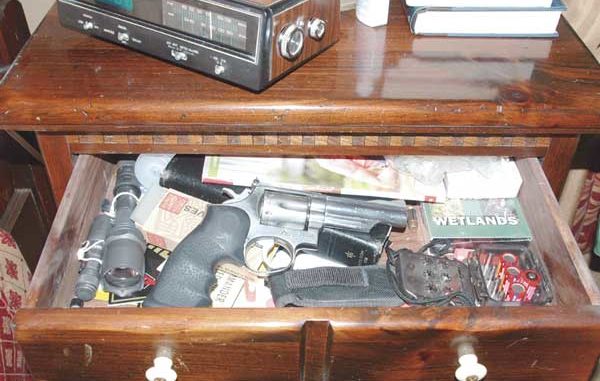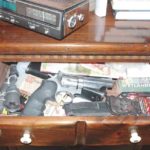
What’s fiercer than a man-eating shark? Perhaps a Rat-L-Trap-chomping redfish in this south-central Louisiana hotspot.
You’ve probably read it a thousand times. Read it once more here, and realize your rights to own firearms can hinge on the upcoming Supreme Court interpretation of this particular amendment: “A well-regulated militia, being necessary to the security of a free state, the right of the people to keep and bear arms, shall not be infringed.”
The Founders wrote the first 10 amendments to the Constitution as an enumeration of rights they believed were God-given, inalienable rights no government could usurp, and they wanted these rights written down in order to ensure they would forever remain noted in the mind of man.
In the last hundred years or so, no part of the Bill of Rights has been so contested or discussed as the Second Amendment. Anti-gunners in their hate and biases have taken the tenuous view that the Founders intended the Second Amendment as a “collective” rather than an “individual” right.
In taking this view, their argument is the Founders always intended the Second to mean the “militia,” or National Guard. According to this interpretation, no private citizen is guaranteed under the Constitution the right to “keep and bear” firearms. This argument contends the militia is a part of a standing army, and only the militia may have the weapons.
The opposing view of gun enthusiasts, Libertarians and most conservatives is that the Founders intended the right of self-defense to be God-given, and intended the citizenry be armed to defend itself against the government. Only through the ever-present threat of an armed body of citizens would government not run rampant over the will of the people.
The Founders had just come out of a war of independence in which a king in another country attempted to rule their lives through the intercession of armed troops — and through the attempted confiscation of personal firearms. The Founders wanted to ensure that now and forever the government would answer to the people. The only way this could be guaranteed was if the people were able to retain their personal weapons for self-defense.
Millions of pages and gallons of ink have been used in printing arguments and dissections of the Second Amendment attempting to prove what the Founders actually intended in their descriptions of the “militia” and that all-important description of the “people.”
In studying what the Founders wrote not only in the other Amendments, but in their own personal papers, it is readily apparent they intended “the people” to be exactly that — the body of the citizenry. To claim the terminology a “well-regulated militia” represents the body of the people and thus endows a collective right to a militia alone is difficult to argue in view of statements in the rest of the Bill of Rights.
The First Amendment states: “Congress shall make no law … abridging … the right of the people peaceably to assemble, and petition the government for a redress of grievances.”
The Fourth Amendment states that “the right of the people to be secure in their persons, houses, papers and effects, against unreasonable searches and seizures, shall not be infringed.”
The Ninth Amendment states: “The enumeration in the Constitution of certain rights, shall not be construed to deny or disparage others retained by the people.”
Defenders of the interpretation of the Second as an individual right point out that in all other cases (and in numerous examples in their personal papers), the Founders intended the term “the people” to be the body of the citizenry. Why then, they argue, should only one Amendment (the Second) be singled out for a different interpretation of what the framers of the Constitution meant?
With no determination by federal courts as to the actual intent of the Founders, a hodge-podge of disparate and restrictive gun laws has sprung up across the nation, with many municipalities attempting to control crime in their cities through banning or restricting the ownership of firearms, and nowhere has there been designed any more restrictive firearms ownership laws than in the nation’s capital.
Years ago, faced with staggering crime statistics, the municipality of Washington D.C. instituted the most restrictive gun-control laws in the nation. Under D.C. law, no one may own a handgun of any type. If a homeowner possesses a long gun for personal self-defense in his household, the gun must be disassembled or be rendered inoperative through use of a trigger lock.
The assumption was if the gun was needed for self-defense, the homeowner would have time to assemble the gun or remove the trigger lock.
It is not necessary here to go into the crime statistics of Washington D.C. Most everyone is aware of the murder and armed robbery rates in that city, and how it leads the nation in spite of such restrictive firearms ownership laws. In fact, several studies have shown crime rates rose substantially and continued to climb after the institution of the handgun ban.
Some years ago, a group of lawyers decided the makeup of the Supreme Court was as favorable as it had ever been, and was likely to get in the foreseeable future. This group decided to attempt to bring a “clean”case before the Supreme Court to have the interpretation of the Second Amendment reviewed by that court. It was felt the time was ripe for a conservative interpretation to come out of the court, and put to lie some of the abhorrent and restrictive gun-control laws that have plagued gun owners across the nation.
Since this group operated in D.C., and since that city’s gun laws were so restrictive as to be unconstitutional, it was decided to produce a test case.
Robert Levy, a wealthy businessman who did not attend law school until he was 50 years old, and is a senior fellow in Constitutional Studies at the Cato Institute, has funded the entire lawsuit while it has been shepherded through the courts.
Levy determined that allowing other organizations and persons to assist in funding the case would have resulted in a loss of control and focus, so he has remained the sole funding agent of this case as it has been presented and argued. He picked the District of Columbia because it is unique, with one of the highest violent crime rates in the nation and the most restrictive gun laws.
Assembling six complainants, all upstanding citizens, racially diverse, the case was originally brought against the District of Columbia by lead attorney Alan Gura. The case was brought under the name of one of the complainants as Parker vs. the District of Columbia in the U.S. Court of Appeals for the District of Columbia — considered by most to be the second most important court in the nation.
In his argument to the D.C. Court of Appeals, Gura argued that banning the possession of handguns and forcing restrictions on ownership of long guns within the confines of private residences was undue meddling in the personal lives of the citizens, and violated the Second Amendment’s contention that the right of the people to keep and bear arms shall not be infringed.
The D.C. Court of Appeals held for the complainants, throwing out the decades-old D.C. laws. In spite of considerable consternation and arguing on the parts of supporters against doing so, the District appealed to the Supreme Court, and the stage was set for a landmark case to be heard on March 18, 2008.
In agreeing to hear the history-making case, the Supreme Court held that only one complainant, a federal security guard by the name of Dick Anthony Heller, actually had his Second Amendment rights violated, and would only hear arguments defending or attacking his case. Heller’s complaint was that he is charged with defending the lives of federal employees as an armed guard, but could not even own a handgun for self-defense once he left the job.
The Supreme Court heard the case in March with a decision expected sometime in June. The case generated an astoundingly high number of “Amici Curiae” briefs arguing pro or con in addition to the originally filed case. Amicus briefs supporting the rights of law-abiding individuals to keep guns in their homes included the following:
• More than half of the Congress of the United States — 55 senators, led by Kay Bailey Hutchinson of Texas, 250 members of the House of Representatives and a separate brief by Vice-President Dick Cheney as president of the Senate. It should be noted here the two briefs from the houses of Congress were bi-partisan, including many Democrats who signed on with their Republican corespondents.
• Thirty-one states led by Texas Solicitor General Ted Cruz argued the individual right to keep and bear arms is protected by the U.S. Constitution and the constitutions of 44 states.
• High-ranking retired military officers from Army, Navy, Air Force, Marine Corps and National Guard filed a brief explaining the collectivist view of the Second Amendment “would undermine both military preparedness and national defense.”
• Criminologists, scholars and physicians challenged the disingenuous claims by the District that its handgun ban has reduced crime. It has been shown in numerous studies that the crime rate took a rapid upward swing once private ownership of firearms was practically eliminated. Crime has not decreased since the ban, but has actually increased tremendously.
The general consensus among most of the court watchers was the decision will be in favor of the complainants. Comments by the judges indicated a leaning by the majority toward considering the Second Amendment as an individual right.
Justice Kennedy, generally considered a centrist and a swing vote, stated unequivocally he believes the Second Amendment is an individual right. This statement, if followed through, gives at least a majority of five to four in favor of the individual right to own firearms.
But it should be remembered that all this case will decide is the constitutionality of one law in one municipality. The court can throw out the District’s draconian gun policies, and allow its citizens to once again arm themselves, at least in their homes, in self-defense.
It will not automatically throw out restrictive and onerous prohibitionist-type laws across the country. The decision will not determine questions constantly presented by restrictive laws as to whether a person can own more than one gun, or buy more than one a week, month, year, etc. Nor will it answer the constant festering argument against semi-automatic rifles similar to military weapons that anti-gunners insist on calling “assault” rifles.
In all these cases, and more, it will take far more litigation to determine these questions in the eyes of the law.
But one thing Heller will have done — it will settle once and for all the argument that the Founders thought the right of the citizenry to be armed is a collective or individual right. It will either strengthen gun ownership arguments across the nation and question the constitutionally of a lot of gun laws or open the door to a countless cascade of onerous laws aimed at restricting or ending our firearms ownership rights.
We’ll know in June.
By the way, two excellent websites on the District of Columbia vs. Heller case are: www.DCGuncase.com and www.frontpage.americandaughter.com/?cat=878
Gordon Hutchinson’s newest book, co-authored with Sportsman Editor Todd Masson, is The Great New Orleans Gun Grab, an expose of the gun-confiscation scandal that occurred in New Orleans after Hurricane Katrina. It can be found at www.neworleansgungrab.com.
Hutchinson’s first book, The Quest and the Quarry, is a generational tale that parallels the lives of a line of trophy bucks and the youth of a farming family that hunts them. It was chosen as a book of the year by the Southeastern Outdoor Press Association. It can be found at www.thequestandthequarry.com.
Both books can be ordered by calling 800-538-4355.




